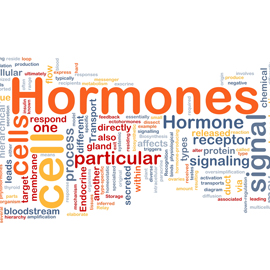Understanding Hormone Imbalance
 Hormones are chemical messengers that travel through the bloodstream. They are produced by organs in the endocrine system, which includes the testes, ovaries and adrenals, as well as the thyroid, pancreas and pituitary glands. Hormones are sent from the endocrine system out to the tissues and other organs to regulate certain bodily functions.
Hormones are chemical messengers that travel through the bloodstream. They are produced by organs in the endocrine system, which includes the testes, ovaries and adrenals, as well as the thyroid, pancreas and pituitary glands. Hormones are sent from the endocrine system out to the tissues and other organs to regulate certain bodily functions.
Testosterone, estrogen, progesterone and DHEA are four of the primary sexual hormones produced naturally. Each of these hormones is present in both men and women, in different levels. They are considered sexual hormones because of their influence on reproduction and sexual functioning. Fluctuations of these hormones with age are most highly associated with age-related illness.
Other hormones include cortisol, which regulates the body’s stress response; melatonin, which encourages proper sleep; and ghrelin and leptin, which manage appetite.
Hormones and your Health
Hormone levels naturally fluctuate throughout life, and these fluctuations cause changes in body shape, energy levels and health. Hormone levels spike during puberty, and then naturally decline with age. Men and women may begin experiencing age-related health decline due to fluctuating hormone levels as early as age 40. Yet, there are a big portion of population that have the condition called Hypogonadism (insufficient testosterone production unrelated to age).
Hormones influence many different bodily functions, including:
- Metabolism and weight level
- Sexual function
- Fertility or Reproduction
- Mood
- Hair growth
- Energy levels
Symptoms like weight gain, mood swings and hot flashes are especially common with age. Restoring hormone levels to their balanced state can reduce the severity and frequency of these symptoms.
Causes of Hormone Imbalance
Changes in hormone levels will occur naturally, or as a result of environmental and biological factors. Extreme stress, the use of certain medications and biological processes like pregnancy will often cause hormone levels to fluctuate.
There are several factors that will influence your risk of hormone imbalance:
- Use of certain steroids or oral birth control pills
- Sedentary lifestyle
- Poor sleeping habits
- Overeating or other poor nutrition habits
- High stress level
Hormone Imbalance in Women
Women often experience hormone imbalance during menopause, which is the period marking the end of menstruation. For some women, sudden drops in estrogen levels lead to uncomfortable symptoms like weight gain, lost interest in sex, hot flashes and night sweats. These are commonly thought of as the symptoms of menopause, but are actually a result of hormone imbalance.
Hormone Imbalance in Men
The primary male sexual hormone is testosterone. It contributes to male sexual development, as well as muscle development and growth. Low testosterone levels, or Low T, can result in lost sexual interest, reduced energy levels, mood swings and physical weakness. This period of post-middle-age hormone decline is known as andropause, or male menopause.
Treatment for Hormone Imbalance
Hormone levels can be restored through anti-aging therapies like bioidentical hormone replacement. This treatment method uses injections, creams, oral medications or hormone pellet implants to stabilize hormone levels. Hormone replacement therapy is available for men and women using bioidentical versions of estrogen, progesterone and testosterone.
There are a series of lifestyle changes that may help to stabilize hormone levels. Eating a well-balanced diet, exercising regularly and getting eight hours of quality sleep may prevent mild hormone imbalance.


